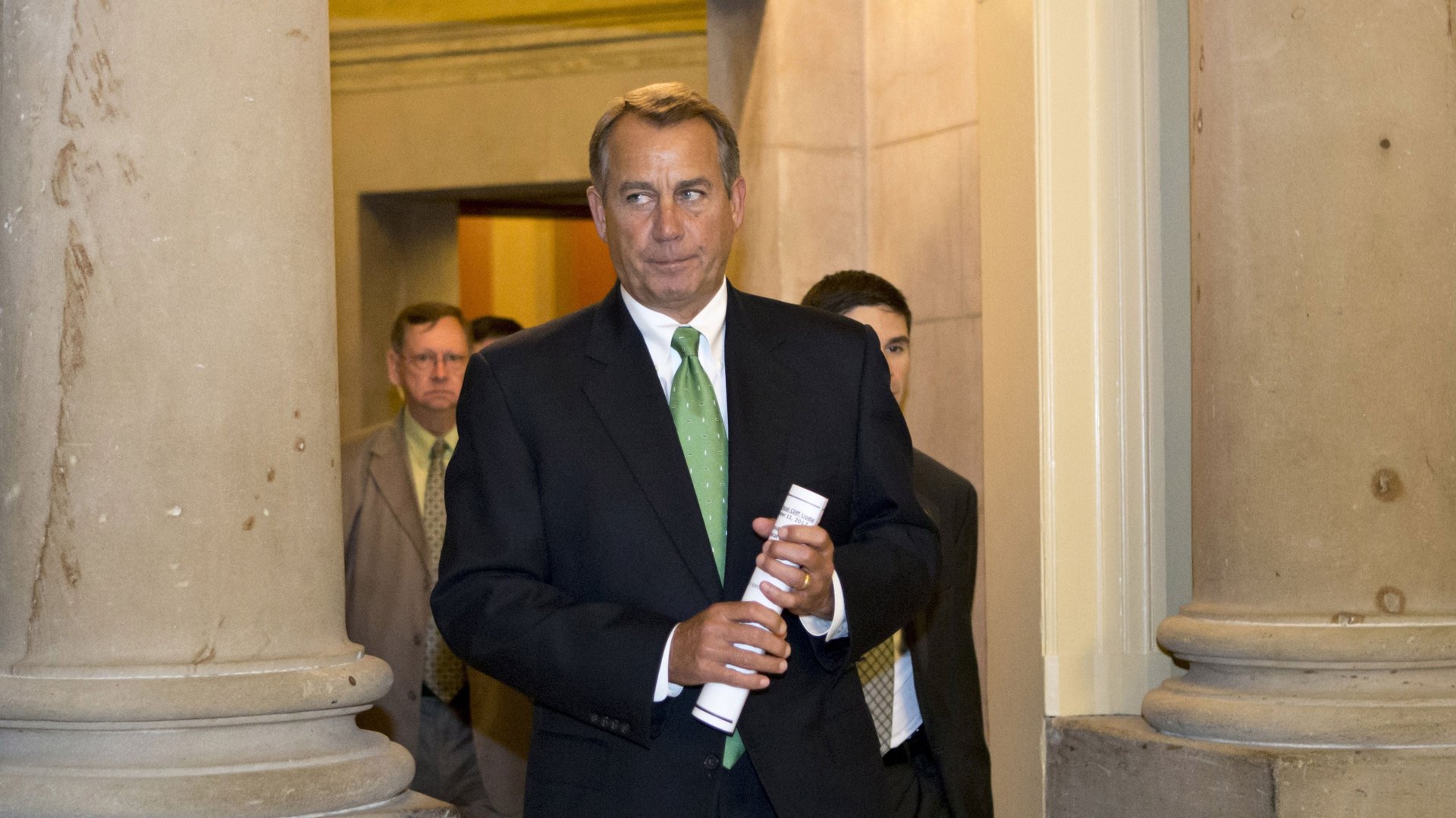The outlines of a deal to avoid the fiscal cliff are emerging
US House Speaker John Boehner and President Barack Obama are edging closer to an agreement that would avoid the automatic austerity measures known as the “fiscal cliff” that are due to take effect in the new year. However, with just 13 days left in 2013, friction on exact numbers remains—as does disgruntlement from House Republicans, with whom Boehner will meet today. Here are the key elements of Obama’s latest proposal:


US House Speaker John Boehner and President Barack Obama are edging closer to an agreement that would avoid the automatic austerity measures known as the “fiscal cliff” that are due to take effect in the new year. However, with just 13 days left in 2013, friction on exact numbers remains—as does disgruntlement from House Republicans, with whom Boehner will meet today. Here are the key elements of Obama’s latest proposal:
- The president’s new plan puts forth $1.2 trillion in tax revenues over 10 years, down from $1.4 trillion, for a total of $2.4 trillion in both cuts and revenues.
- Obama raised the threshold for extending Bush-era tax rates to households earning less than $400,000, implying a 39.6% top-bracket rate, up from 35%. The New York Times reports that Boehner is prepared to accept Obama’s long-standing proposal of a 28% tax deduction cap, down from the current 35%.
- Included in the $1.22 trillion in spending cuts are some $400 billion in entitlement savings, up from $50 billion in Obama’s previous proposal. As for other spending cuts, the president proposed $800 billion in reduced spending on programs, including $100 billion from defense outlays and $100 billion from discretionary spending. Ezra Klein predicts the two sides will agree to around $1 trillion in unspecified cuts, noting that cuts to Medicare or Medicaid are still on the table–as is nudging up the qualification age for Medicare. In the event of a deal, these details will fall to Congress to resolve.
- The Democrats are also accepting the “chained CPI” approach that Boehner has championed, which would be a de facto cut in Social Security benefits.
- In terms of stimulus, Obama’s proposal includes $50 billion for new infrastructure and $30 billion in unemployment benefit extensions. Out the window goes extension of the payroll tax cut, alas.
- The jury remains out on cranking up the debt ceiling, as well, though Talking Points Memo flags that Boehner is conditionally open to upping it.
Considering that Boehner has conceded on allowing tax hikes—though only on incomes higher than $1 million—and that Obama has given ground on chained CPI, negotiations are now largely about agreeing on numbers, and less focused on overall structure.
The obvious question remains whether Boehner can bring his fellow House Republicans to Jesus on the current framework under negotiation, to say nothing of the numbers under debate. The outlook on both is still hazy: First Read notes that Republicans feel the Dems are playing fast and loose with counting interest-payment savings toward overall entitlement cuts, and Politico reports that Republicans have highlighted a couple of other potential sticking points, notably Obama’s proposed stimulus measures.
Meanwhile, Politico is now reporting that Boehner will simultaneously bring a “Plan B” bill to the House floor that includes tax hikes on incomes exceeding $1 million, though the Speaker will continue negotiating with the White House. This show of Boehner’s backbone may be more designed to stave off threats to his role as speaker from within the party than it is a viable negotiating ploy.
On the left, however, some continue to wonder whether going over the fiscal cliff might not be preferable to accepting slashed Social Security benefits required by the chained CPI measure, which economist Dean Baker says will level a “substantial hit to a population that for the most part is ill-prepared to see a cut in its income,” particularly since the current iteration of the bargain lacks a revenue offset to the proposed cuts. Greg Sargent reports that the left is gearing up to press Harry Reid to put the kibosh on Social Security cuts. Still, Paul Krugman points out that those cuts are “not nearly as bad as raising the Medicare age,” given that they would actually “kill people.”
Despite enduring misgivings from both sides of the aisle, Obama’s and Boehner’s gradual convergence on both framework and numbers suggests a gathering momentum that even the House Republicans might struggle to obstruct.